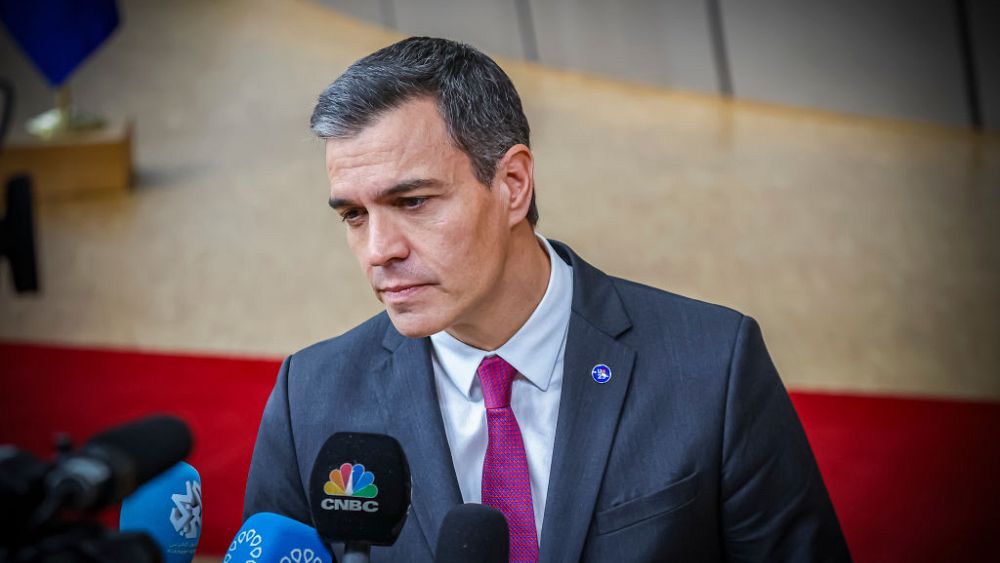Prime Minister Pedro Sánchez has started a tour of the Middle East plagued by the Israel-Hamas conflict.
Spanish Prime Minister Pedro Sánchez has been in the Middle East since Wednesday November 22. In the midst of the conflict between Israel and Hamas, Spain is seeking to make its voice heard. Historically close to the Arab world, the country strives to promote, within the European Union, a line more favorable to Palestinian aspirations.
Reappointed just a week ago for a new four-year term as prime minister, Pedro Sánchez met his counterparts, Prime Minister Benjamin Netanyahu in Israel and President of the Palestinian Authority Mahmoud Abbas in the West Bank.
Pedro Sánchez is in Egypt this Friday, where he will meet President Abdel Fattah al-Sissi and Ahmed Aboul Gheit, Secretary General of the Arab League.
These meetings will be an opportunity for the Spanish Prime Minister to renew his call for a lasting ceasefire in Gaza and the holding of an urgent peace summit.
Spain hopes for a political solution to the conflict between Israel and the Palestinians, on the basis of two states.
Spain, a voice in support of the Palestinians within the EU
In a speech delivered last Wednesday, Pedro Sánchez promised that the “first engagement” of his new government in terms of foreign policy would be “work in Europe and Spain for the recognition of the Palestinian state”.
At the same time, he said to himself “on the side of Israel” in front of “the terrorist attack” committed by Hamas on October 7, but also called on the Jewish state to end “the indiscriminate killing of Palestinians”.
According to Isaías Barreñada, professor at the Complutense University of Madrid, Pedro Sánchez hopes that his position will “a ripple effect” on the rest of the EU.
The stance comes at a time when many Western countries are facing criticism in the Arab world for apparently being too supportive of Israel.
In 2014, under a conservative government, the Spanish Parliament passed a resolution calling for recognition of the Palestinian state, supported by all political parties.
The vote was not binding, however, and was not followed by any action.
Within the EU, several countries recognize the Palestinian state.
These include Sweden, Hungary, Malta and Romania, but none of the major EU member states have done so, meaning Spain could become a pioneer.
Earlier this week, Josep Borrell, High Representative of the Union for Foreign Affairs and Security Policy – and former minister of Pedro Sánchez – told the Spanish daily, “El Pais”, that Spain was a country with “a clearer sympathy for the Arab world”.
Historical Spanish-Arab relations
Geographically close to the Maghreb, Spain turned to Arab countries during the Franco dictatorship, from 1939 to 1975, in order to circumvent its isolation in the West.
It was not until 1986 that the country established official relations with Israel.
This relatively late date is the consequence of tensions arising from the Hebrew state’s opposition to Spain’s entry into the UN at the end of the Second World War, due to its proximity to Nazi Germany. .
Madrid then went so far as to play mediator, thus hosting a Peace Conference in 1991, with for the first time all the Arab parties in direct conflict with the Jewish state: Palestinians, Syrians, Jordanians and Lebanese.
Two years after this conference, the Oslo Accords, through which Israel and the Palestine Liberation Organization (PLO) mutually recognized each other, were signed in Washington.
But overall, Spain remains perceived by many actors as pro-Arab. At the end of October, a mini diplomatic crisis even broke out with the Israeli embassy after controversial statements by a far-left Spanish minister who spoke of a “planned genocide” in Gaza.
Given the differences within the EU, “it is difficult to imagine that Spain has the capacity to reorient the European position” but “it can help to show that there are different sensitivities within the EU”believes Isaías Barreñada.



